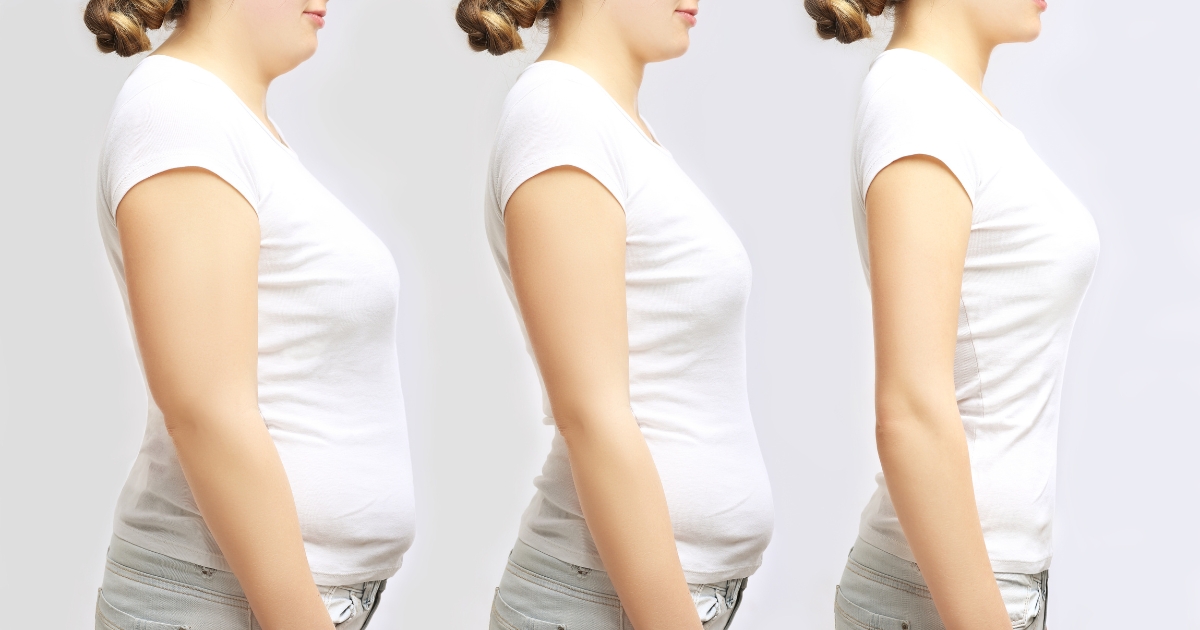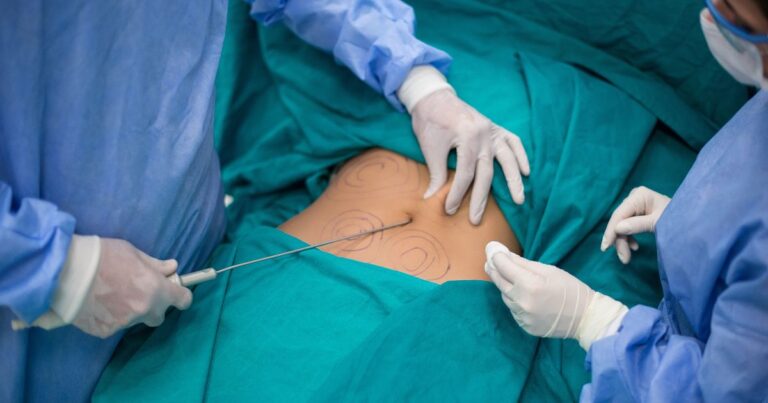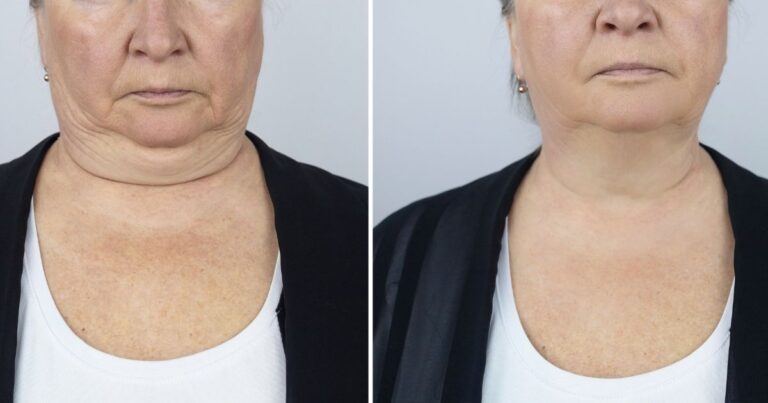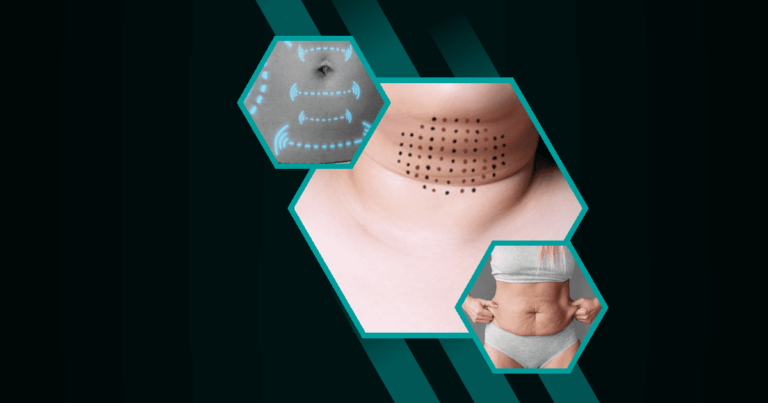Morbid obesity is a complex and severe health condition characterised by excessive body fat. Treatment options typically involve making dietary and lifestyle changes, taking medications, or considering surgical interventions.
Two common surgical interventions for morbid obesity include liposuction and weight loss surgery, such as gastric bypass or sleeve gastrectomy. This article compares liposuction and weight loss surgery by highlighting their differences, risks, benefits, and appropriate use in specific scenarios.
What Are the Primary Differences Between Liposuction and Weight Loss Surgery?
Liposuction and weight loss surgery are popular methods for reducing body fat but serve different purposes. The liposuction procedure involves removing localised fat deposits to contour specific areas, while weight loss surgery is a medical intervention aimed at substantial weight reduction.
Weight loss surgery often includes procedures like gastric bypass or gastric banding and is typically pursued by those with significant obesity. The choice between the two depends on various factors, including the amount of weight to lose, the patient’s health, and desired outcomes.
Book A Consultation With Dr Tarek Bayazid
Top-rated Plastic Surgeon For Liposuction in Dubai
Installment Plan Available
| Aspect | Liposuction | Weight Loss Surgery |
| Purpose | Cosmetic | Medical |
| Target Areas | Localised fat | Overall weight |
| Typical Candidates | Healthy, minor fat | Significant obesity |
| Procedure Complexity | Less invasive | More invasive |
| Outcome | Body contouring | Substantial weight loss |
How Effective is Liposuction in Treating Morbid Obesity Compared to Other Weight Loss Surgeries?
Liposuction primarily focuses on enhancing appearance by removing fat pockets rather than treating morbid obesity. Conversely, weight loss surgeries like gastric bypass aim to decrease stomach size and restrict food intake to address morbid obesity effectively. While liposuction can eliminate localized fat deposits, it does not result in significant weight loss or improvement in obesity-related health conditions. Weight loss surgery is typically recommended for individuals with a BMI above 40, whereas liposuction is more commonly pursued by those nearing their ideal weight.
| Factor | Liposuction | Weight Loss Surgeries |
| Targeting Morbid Obesity | Ineffective | Effective |
| Weight Loss Amount | Minor | Significant |
| Impact on Health | Minimal | Can improve conditions |
| BMI Suitability | Below 30 | 40 and above |
What Are the Potential Risks and Complications of Liposuction vs. Weight Loss Surgery?
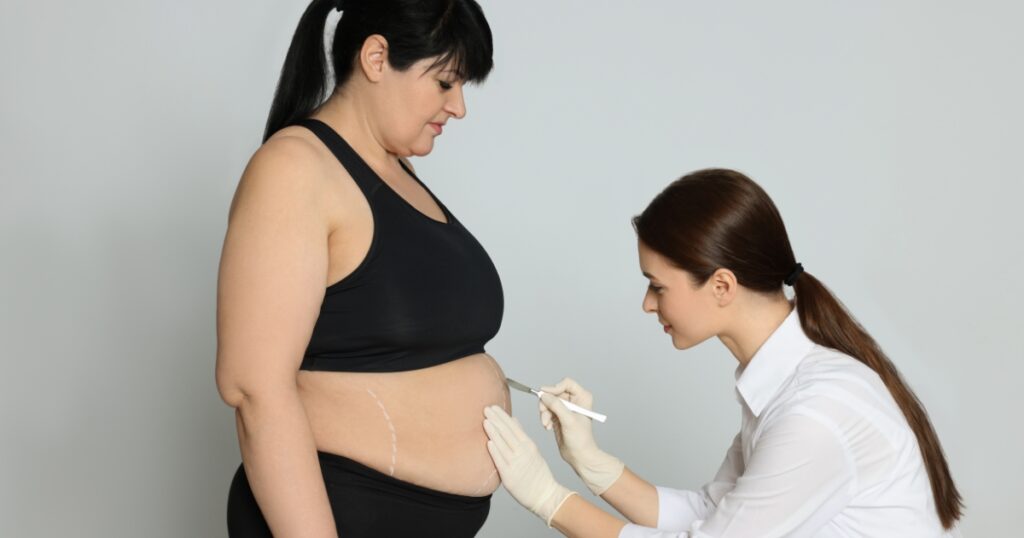
Both liposuction and weight loss surgery come with their share of risks and complications, although they differ in scope and severity. Liposuction carries the potential for bruising, infection, and uneven contouring, while weight loss surgery may result in nutrient deficiencies, dumping syndrome, or more serious issues such as leaks in the gastrointestinal system.
However, choosing the right procedure and surgeon, along with practising proper postoperative care, can effectively minimise these risks.
| Risks/Complications | Liposuction | Weight Loss Surgery |
| Common | Bruising, swelling | Nutrient deficiencies |
| Serious | Uneven contouring | Leaks, dumping syndrome |
| Long-term Care Required | Usually minimal | Often significant |
Which Procedure is More Suitable for Patients with Morbid Obesity: Liposuction or Weight Loss Surgery?

For individuals suffering from morbid obesity, weight loss surgery often emerges as the more suitable choice than liposuction. While liposuction does not aim to achieve significant weight reduction and fails to address the underlying health issues associated with obesity, weight loss surgery holds the potential for substantial weight loss and remarkable improvement in related health conditions like diabetes and hypertension.
| Factor | Liposuction | Weight Loss Surgery |
| Suitability for Morbid Obesity | Inappropriate | Appropriate |
| Health Impact | Minimal | Can improve conditions |
| Weight Loss | Limited | Substantial |
What Are the Costs of Liposuction in Dubai Compared to Weight Loss Surgery for Morbid Obesity?
The costs of liposuction and weight loss surgery in Dubai can vary. Factors such as the specific procedure, the expertise of the surgeon, and post-surgery care influence the price. Generally, weight loss surgery tends to be more expensive in Dubai due to its complexity, ongoing follow-up care requirements, and associated hospital stays. On the other hand, liposuction is less invasive and usually more affordable. However, it is rare for insurance to cover this cosmetic procedure.
| Factor | Liposuction | Weight Loss Surgery |
| Average Cost (in Dubai) | Lower (AED 7999 to 18000) | Higher (AED 25,000 – AED 70,000) |
| Inclusions | Surgery only | Surgery, follow-up care |
| Insurance Coverage | Rarely | Often for medical need |
How Long is the Recovery Time for Liposuction vs. Weight Loss Surgery?
Recovery times vastly differ between liposuction and weight loss surgery. Liposuction typically entails a shorter recovery period, usually from a few days to weeks. Conversely, weight loss surgery necessitates a lengthier recovery phase, ranging from several weeks to months depending on the specific procedure and individual patient factors.
| Factor | Liposuction | Weight Loss Surgery |
| Typical Recovery Time | Days to weeks | Weeks to months |
| Hospital Stay | Rarely | Often required |
What Are the Long-term Benefits and Drawbacks of Liposuction and Weight Loss Surgery?
Long-term benefits and drawbacks significantly differ between liposuction and weight loss surgery. Liposuction offers lasting body contouring but only limited weight loss. On the other hand, weight loss surgery can lead to substantial long-term weight reduction and improvements in health. While liposuction may result in dissatisfaction with results, weight loss surgery often necessitates lifelong dietary changes and supplementation.
| Factor | Liposuction | Weight Loss Surgery |
| Long-term Benefits | Body contouring | Significant weight loss, health improvement |
| Drawbacks | Possible dissatisfaction | Lifelong dietary changes |
Can Liposuction Be Used as a Treatment for Morbid Obesity, or Is It More Cosmetic?
Liposuction is a cosmetic procedure that aims to reshape specific areas by removing localised fat. However, it is essential to note that liposuction is not suitable for treating morbid obesity or achieving significant weight loss. The recommended approach for addressing morbid obesity is weight loss surgery. Unlike liposuction, weight loss surgery targets overall weight reduction and can lead to substantial health improvements.
| Factor | Liposuction | Weight Loss Surgery |
| Treatment for Morbid Obesity | No | Yes |
| Primary Purpose | Cosmetic | Weight loss |
What Are the Psychological Impacts of Choosing Liposuction vs. Weight Loss Surgery for Morbid Obesity?
The impacts of liposuction and weight loss surgery on individuals’ psychological well-being can vary considerably. While liposuction may enhance one’s confidence in appearance, it does not address the underlying issues related to obesity. On the other hand, weight loss surgery has demonstrated significant improvements in self-esteem, body image, and even mental health. Nevertheless, it can also present challenges regarding adapting to a new lifestyle and body perception.
| Factor | Liposuction | Weight Loss Surgery |
| Positive Impacts | Improved appearance | Improved self-esteem, mental health |
| Possible Negative Impacts | Unmet expectations | Adjustment challenges |
How to Choose Between Liposuction and Weight Loss Surgery: A Guide for Patients with Morbid Obesity.
When deciding between liposuction and weight loss surgery, it is important to consider various factors carefully. These include the patient’s goals for the surgery, overall health status, extent of obesity, and individual preferences. Making informed decisions necessitates consulting experienced healthcare providers who specialise in these areas. Their expertise will greatly assist in making the right choice.
| Consideration | Liposuction | Weight Loss Surgery |
| Goal | Contouring | Weight loss |
| Health Consideration | Minor issues | Significant obesity |
| Expert Consultation | Essential | Essential |
What Are the Medical Criteria for Selecting Liposuction or Weight Loss Surgery in Morbid Obesity Cases?
Medical professionals determine whether to recommend liposuction or weight loss surgery based on various factors, including the patient’s overall health, weight, body mass index (BMI), existing medical conditions, and desired outcomes. Liposuction is typically suitable for individuals with localised fat deposits and a BMI below 30. On the other hand, weight loss surgery is considered for those facing significant obesity and accompanying health concerns.
| Criteria | Liposuction | Weight Loss Surgery |
| BMI | Under 30 | 40 and above |
| Health Conditions | Minimal impact | Considered |
| Goals | Cosmetic | Weight loss, health improvement |
How Have Recent Advances in Technology Affected the Choices Between Liposuction and Weight Loss Surgery for Morbid Obesity?
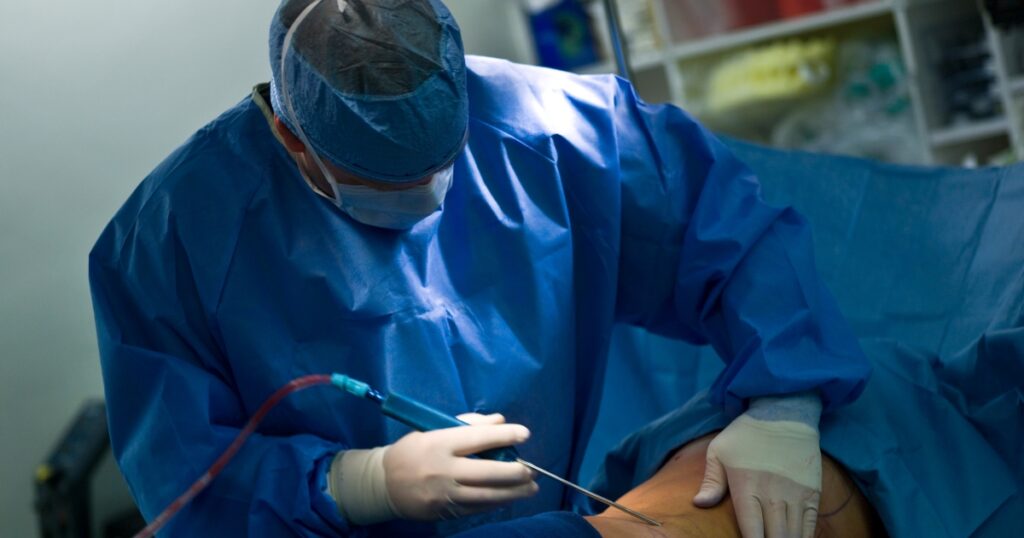
Recent technological advances have expanded the options and enhanced the safety and effectiveness of both liposuction and weight loss surgery. In the realm of liposuction, innovative techniques now enable more precise contouring and expedited recovery. As for weight loss surgery, applying minimally invasive laparoscopic methods has yielded swifter recuperation periods with fewer complications. Nonetheless, the ultimate decision between these two approaches primarily hinges on a patient’s individual needs and medical condition.
| Aspect | Liposuction | Weight Loss Surgery |
| Technological Advances | Precision reduced recovery | Minimally invasive, safer |
| Impact on Choice | Improved options | Expanded, safer options |
Liposuction and weight loss surgery serve distinct purposes in the treatment of obesity. Liposuction is most effective for refining specific areas but unsuitable for addressing severe obesity. In contrast, weight loss surgery offers considerable benefits to individuals dealing with significant obesity concerns. Choosing between these options necessitates careful evaluation of one’s unique needs alongside expert guidance and consultation.
If you are considering liposuction or weight loss surgery and need professional guidance, we recommend to book a consultation with Dr Tarek Bayazid, a renowned plastic surgeon in Dubai. What sets Dr Tarek Bayazid apart is his patient-focused approach to aesthetic procedures. He offers a wide range of sought-after treatments, catering to both non-surgical enhancements and comprehensive surgical options.
Trained by renowned plastic surgeons in Europe, Dr Tarek holds a license from the Serbian Medical Chamber and Dubai Health Authority (DHA). His exceptional skills have earned him memberships in prestigious societies like ISAPS and MAFAC. With a strong commitment to excellence, he consistently strives to enhance the lives of his patients through aesthetic processes.
FAQs
Can liposuction be used as a weight loss method?
Liposuction is not suitable for significant weight loss. Instead, it is most effective for individuals near their ideal weight and desire to address specific problem areas of stubborn fat.
How effective is weight loss surgery for morbid obesity?
The most suitable weight loss surgery for individuals with morbid obesity varies based on personal factors and consultation with a healthcare professional. Common options include gastric bypass, gastric sleeve, and gastric banding processes.
What are the risks of weight loss surgery?
Weight loss surgery carries several risks. These include the potential for infection, bleeding, blood clots, leaks in the gastrointestinal system, and nutritional deficiencies. It is crucial to have a comprehensive discussion with a healthcare professional to fully comprehend and evaluate these risks.
Can busy moms undergo liposuction without sacrificing much time?
Yes, with modern techniques, liposuction can be done with minimal downtime, allowing busy moms to resume daily activities quickly.
How do I choose between Vaser, Laser, or Traditional liposuction?
To choose between Vaser, Laser, or Traditional liposuction, it’s essential to consult with a skilled and experienced surgeon who can assess your specific needs and goals and recommend the technique that aligns best with your situation and desired outcome. Your body type, the amount of fat to be removed, and recovery preferences will guide this personalised decision.
What is tumescent liposuction, and how does it benefit me?
Tumescent liposuction involves injecting a large volume of anaesthetic fluid, reducing bleeding and pain and providing a smoother recovery.
How can I reduce scarring and ensure smooth results after liposuction?
Following post-op care instructions and using prescribed scar-minimizing products will promote smooth healing and minimise scarring.
What key questions should I ask during my liposuction consultation?
Liposuction preparation includes inquiring about the surgeon’s experience, the best technique for your case, expected results, the recovery process, and potential risks.
